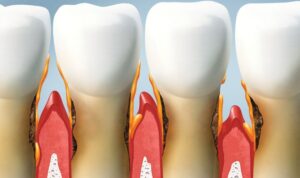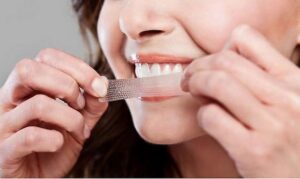Gum disease, also known as periodontal disease, is a common yet preventable oral health issue that affects millions of people worldwide. Characterized by inflammation of the gums and potential damage to the surrounding structures that support the teeth, gum disease can lead to serious complications if left untreated. However, by implementing a few simple yet effective strategies, you can significantly reduce your risk of developing, preventing gum disease and maintain optimal oral health.
Gum Disease
Maintaining good oral health is essential for overall well-being, and gum disease is one of the most prevalent dental conditions. It starts with the buildup of a plate, a sticky film of bacteria that forms on the teeth. When that plat is not removed through regular brushing and flossing, it can harden into tartar, leading to inflammation of the gums and eventually causing gum disease.
Understanding the Causes of Gum Disease
Several factors contribute to the development of gum disease, including poor oral hygiene habits, smoking, genetic predisposition, and certain medical conditions such as diabetes. Plaque and tartar buildup along the gumline provide a breeding ground for harmful bacteria, which can trigger inflammation and infection.
Signs and Symptoms of Gum Disease
Recognizing the early signs of gum disease is crucial for timely intervention and treatment. Common symptoms include bleeding gums, persistent bad breath, receding gums, and loose teeth. If left untreated, gum disease can progress to advanced stages, leading to tooth loss and other complications.
5 Essential Tips for Preventing Gum Disease
1. Brush and floss regularly:
Maintaining a consistent oral hygiene routine is paramount for preventing gum disease. Brush your teeth at least twice a day using fluoride toothpaste and a soft-bristled toothbrush. Additionally, flossing daily helps remove plaque and food particles from between the teeth and along the gumline, where a toothbrush cannot reach.
2. Use mouthwash:
Incorporating an antimicrobial mouthwash into your oral care routine can help reduce plaque and prevent gum disease. Look for mouthwashes containing ingredients such as chlorhexidine or fluoride, which help kill bacteria and strengthen tooth enamel.
3. Maintain a balanced diet:
A healthy diet plays a significant role in oral health. Limit sugary and acidic foods and beverages, as they can contribute to plaque formation and tooth decay. Instead, opt for a balanced diet rich in fruits, vegetables, lean proteins, and whole grains to support overall dental health.
4. Avoid tobacco products:
Smoking and tobacco use not only stain the teeth and contribute to bad breath but also increase the risk of gum disease. Nicotine shrinks blood vessels, limiting the flow of oxygen and infection-fighting cells to your gums. This makes them more vulnerable to inflammation and disease. Quitting smoking is crucial for keeping your mouth healthy and your smile strong.
5. Schedule regular dental check-ups:
Regular visits to the dentist are crucial for preventing gum disease and addressing any oral health issues promptly. Your dentist can perform professional cleanings to remove plaque and tartar buildup, as well as conduct comprehensive exams to detect signs of gum disease early on.
Importance of Dental Hygiene Habits
Practicing good dental hygiene habits not only prevents gum disease but also contributes to overall health and well-being. Poor oral health can cause various systemic conditions, including heart disease, diabetes, and respiratory infections. By prioritizing oral hygiene, you can reduce the risk of developing these serious health issues.
Professional Dental Care and Treatments
In addition to maintaining a diligent oral hygiene routine at home, seeking professional periodontal treatment in St. Petersburg is essential for preventing and treating gum disease. Your dentist may recommend procedures such as scaling and root planning to remove plaque and tartar from below the gumline or periodontal therapy to reduce inflammation and promote gum healing. In severe cases, surgical interventions may be necessary to restore oral health and prevent further damage.






